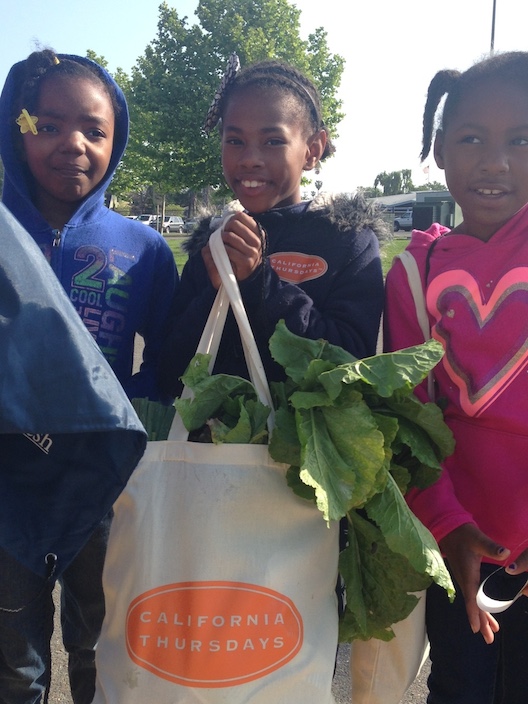Last Thursday I went to a farmers market where there were no cash boxes and no scales. It was at John Still Elementary School in the Sacramento City Unified School District, one of 42 districts in California participating in a program called California Thursdays.
There were about six other stands featuring locally grown produce, fruit, rice, and even someone making smoothies. At around 8:00am waves of excited kids, arriving one grade at a time, started gathering around, all with their California Thursdays cloth bags ready to be filled. Many of the kids had family members with them and everyone had just been served a California-grown breakfast.
The program was sponsored by the Center for Ecoliteracy, one of several efforts (another notable example is the California Farm to School Network’s Harvest of the Month) bringing fresh and local food to the state’s school kids.
Several volunteer interns turned up and took over the engaging job of talking to the kids about carrots and broccoli, and helping them “shop” at my stand, so I had the opportunity to talk to some of the District and School staff that were helping out. One conversation was with the school social worker and her intern. (Perhaps not the correct job title.) I asked them what kinds of issues they worked on. To me, the kids seemed happy, excited, energetic and full of life, like kids on a field trip. There was a notable dearth of Caucasian faces, lots of dark skin and girls with colorful beads in their braided hair. I was momentarily speechless when the social worker answered that suicide was one of the issues they sometimes addressed, along with kids wearing size 3 shoes when their feet are size 5, or community and family violence. “Vegetables are a foreign concept,” she told me, adding that the kids were “super-resilient.”

Towards the end of the market I met a young man who heads up the school garden at the school, runs a small farmers market in the neighborhood, and juggles several additional community activities. It turned out that he had been to Full Belly Farm as a third grader on a school visit and had also come to the Hoes Down Harvest Festival several times. I was struck by the warmth, dedication and positive outlook of all of the staff that I met. I believe that reading writing and arithmetic are critical tools that help kids get ahead, but the conversations that I had that morning really demonstrated that in situations where a community faces social and economic hardships, food and gardening programs can be pretty important as a healthy foundation for academic learning.
— Judith Redmond
